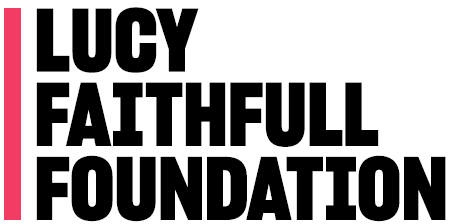Our helpline, direct work with adults and young people, and safer recruitment: the expansion of The Lucy Faithfull Foundation
The 2000s and 2010s saw unprecedented growth in online child sexual abuse and several high-profile child abuse scandals, and our services expanded to meet these and other challenges. In this period, The Lucy Faithfull Foundation expanded to encompass multiple rehabilitation programmes, child protection and training initiatives and the nationwide Stop It Now! helpline.
This special anniversary blog post is the second in a three-part series on the history of The Lucy Faithfull Foundation, celebrating our achievements, evolution and growth over the past thirty years. You can find out more about our history in our anniversary booklet and read parts one and three.
THE STOP IT NOW! UK AND IRELAND HELPLINE (2002 – PRESENT DAY)
Helplines are a well-recognised way of supporting children with various problems, including child protection issues. But ultimately, it is the responsibility of adults to protect children from harm - we must not let children carry that burden. So in 2002, with funding support from the Home Office, we opened the Stop It Now! UK and Ireland helpline, a confidential place where adults can get support and advice if they’re worried about their own, or another adult or young person’s, sexual thoughts, feelings or behaviour towards children. It also supports parents, carers, professionals and survivors. We don’t ask for identifying details so people can talk openly about the help they need and our skilled advisors come from a range of professional backgrounds including the police, probation, education, health, psychology and other helplines.
In our first year, we took 647 calls; in 2021/22 we took over 15,400 calls, emails and live chats. Demand has grown and we’ve grown to try to meet it, but unfortunately each year we miss callers, around 2,832 in 2021/22. New services have helped, including the introduction of an anonymous email in 2005 and live web chat in 2020.
We’re more than just a listening service and callers are encouraged to agree to actions that help keep children safe. In 2021/22, 93% of repeat callers told us they had taken the actions they had previously agreed to.
The helpline has been independently evaluated with findings showing that: ‘the helpline provides a valuable contribution to tackling child sexual abuse by helping people who have sexual thoughts, feelings and behaviour towards children manage their behaviour, and by assisting all callers to be informed about how to protect children and young people from risk of harm.’ (NatCen Social Research, 2014).
Services for young people and their families (2002 - Present Day)
Our work with young people began in 2002 when we started work with criminal justice agencies as part of a National Probation Directorate project. We provided advice, consultancy and training to the Probation and Prison Service in managing the transitions of young people with convictions for sexual offences between what was then called the Juvenile Estate (under 18s), the over 18 estate (18-21) and release. We also carried out a direct assessment of and intervention work with young people within young offender institutions. In 2009 we bid for and won a five-year contract from the Youth Justice Board (YJB) to deliver a range of services including assessments and interventions at young offender institutes; direct work with young people and families; supporting the release and post-release process, and consultancy. We commissioned NatCen Social Research to undertake an evaluation of the work delivered through the YJB contract. The report was published in June 2012 and was very positive about the service and the work undertaken.
In 2010, we started delivering internet safety seminars for children, mainly within educational establishments and funded initially by the Department for Education. The impetus for these seminars arose from concerns within schools regarding the number of children and young people who were engaging in risky online behaviour and who were deemed vulnerable to sexual exploitation, and from an increasing number of calls to the helpline about children and young people who had got into trouble online.
With no similar support available elsewhere, we developed our work into a programme of intervention which became the Inform Young People programme. In 2012 we ran a six-month pilot, providing the service to 11 children and young people. The course was tailored to the needs and circumstances of the young people and delivered only by Foundation practitioners who had experience in working with children and young people. Over the next few years, we learnt from this delivery and developed exercises and resources to guide practitioners in their work. This was the first framework for delivery and was the precursor to the modular toolkit of intervention which exists today.
In 2018, with funding from the Esmée Fairbairn Foundation, we reviewed and redesigned the programme material. In 2021, we started a new project to enable us to train other professionals to deliver the programme to children and young people they work with, allowing us to increase our reach and support more children in need.
Our work has continued to expand, working directly with schools, young people and families to find the best ways to prevent harmful sexual behaviour, and bringing clear, relevant information to young people through a new website, Shore, to be launched in 2022.
SERVICES FOR THOSE ARRESTED FOR ONLINE OFFENDING AND THEIR FAMILIES: INFORM, INFORM PLUS, ENGAGE PLUS (2005 – PRESENT DAY)
Our Inform Plus programe was set up in 2005 to provide a response to the increasing numbers of men contacting the helpline after being arrested for viewing sexual images of children. Police investigations can take anything from a few months to over two years to conclude, meaning that there is often a significant period of time when those arrested are in a state of limbo and often distressed and motivated to reflect on their offending behaviour. With this in mind, Inform Plus was developed with the aim of providing a safe group environment in which people can explore their behaviour and seek practical advice in order to avoid future re-offending.
Our Inform programme was also set up in 2005 to provide both information and support to partners, family members and close friends of people who had been arrested. The arrest is almost always a complete shock, leaving loved ones devastated and not knowing where to turn.
In 2010, Inform Plus and Inform were adapted to include the provision of individualised versions of the programmes. This was primarily developed in recognition of the fact that not everyone was able to attend a group because of practicalities, or if they had particular concerns about sharing their experiences in a group setting.
An adapted version of the programme was made for men who have been arrested, cautioned or convicted of offences relating to online grooming, due to the possibility of them having a slightly different risk profile and treatment needs. Engage Plus was launched in July 2019 initially on an individual basis but then later also for groups.
In April 2020 all programmes were moved online because of the COVID-19 pandemic. Through these programmes, each year we work with over 200 men who have offended online, and a similar number of family members.
SAFER RECRUITMENT TRAINING (2007 – PRESENT DAY)
There were several child sexual abuse scandals and other high-profile crimes that brought safeguarding higher on the political and media agenda. In 2004, and the publication of the Bichard Inquiry into the murders of Holly Wells and Jessica Chapman, we started supporting the Department for Education (DfE) in the design and delivery of ‘Safer Recruitment Training in Education'. Over the next 18 years, we continued to deliver training courses to local authorities, schools, church groups and other professionals, including through train-the-trainer courses.
In 2014/15, and at the invitation of the DfE, we formed a partnership with three other organisations (NSPCC, NASS – National Association of Special Schools, and CAPE – Child Protection in Education) to create the Safer Recruitment Consortium. This consortium took ownership of the accredited Safer Recruitment materials, updated them and developed a ‘Train the Trainer’ course which was rolled these out across the country.
Safer Recruitment training continues to be a key part of our support to professionals, and in 2021/22 we delivered both Safer Recruitment and train-the-trainer courses to 170 people.
Want to find out more about us?
You can find out more about our history in our anniversary booklet and read parts one and three.
Sign up for news & updates
Fill in our newsletter form hereTo support our work to protect children, donate today.
Donate today






